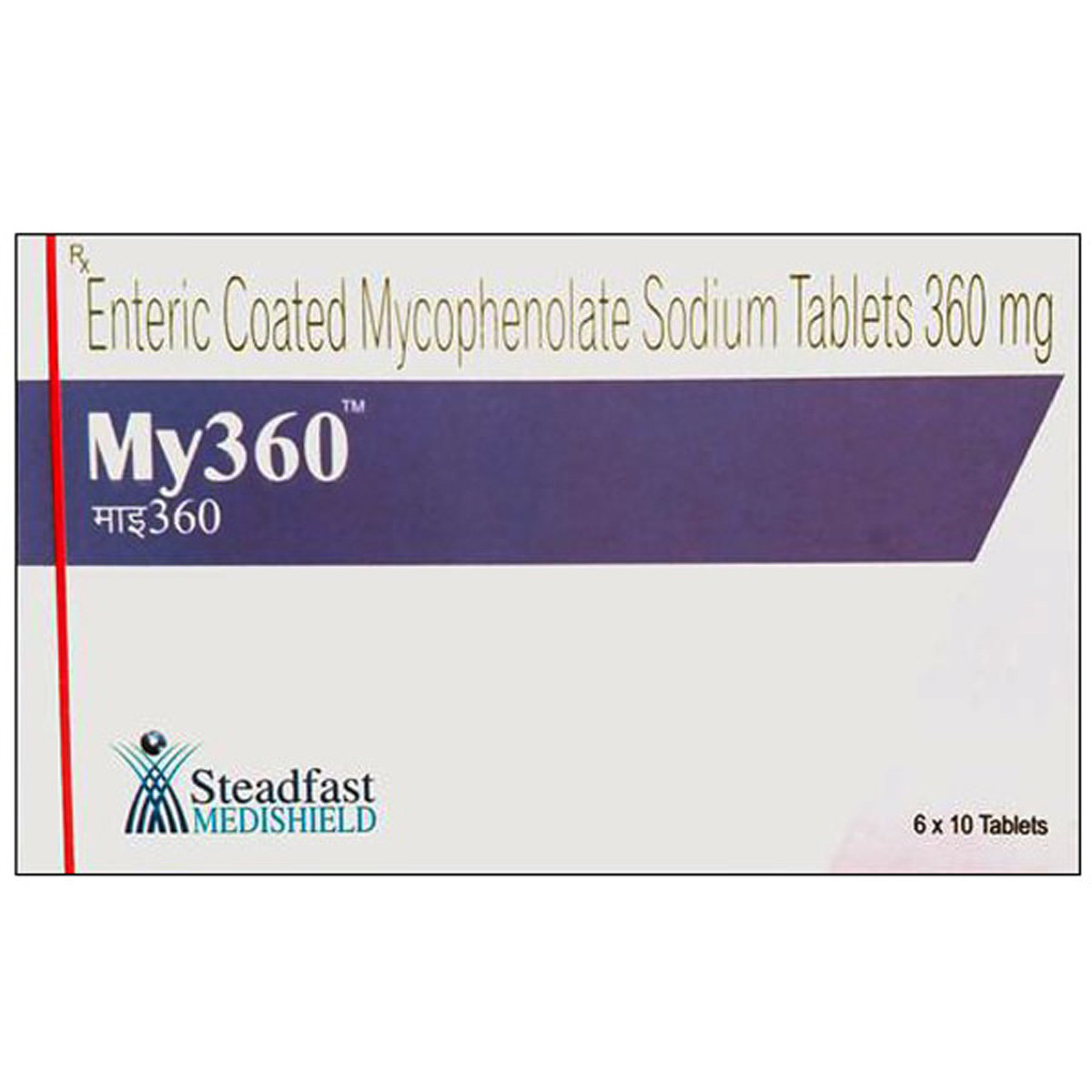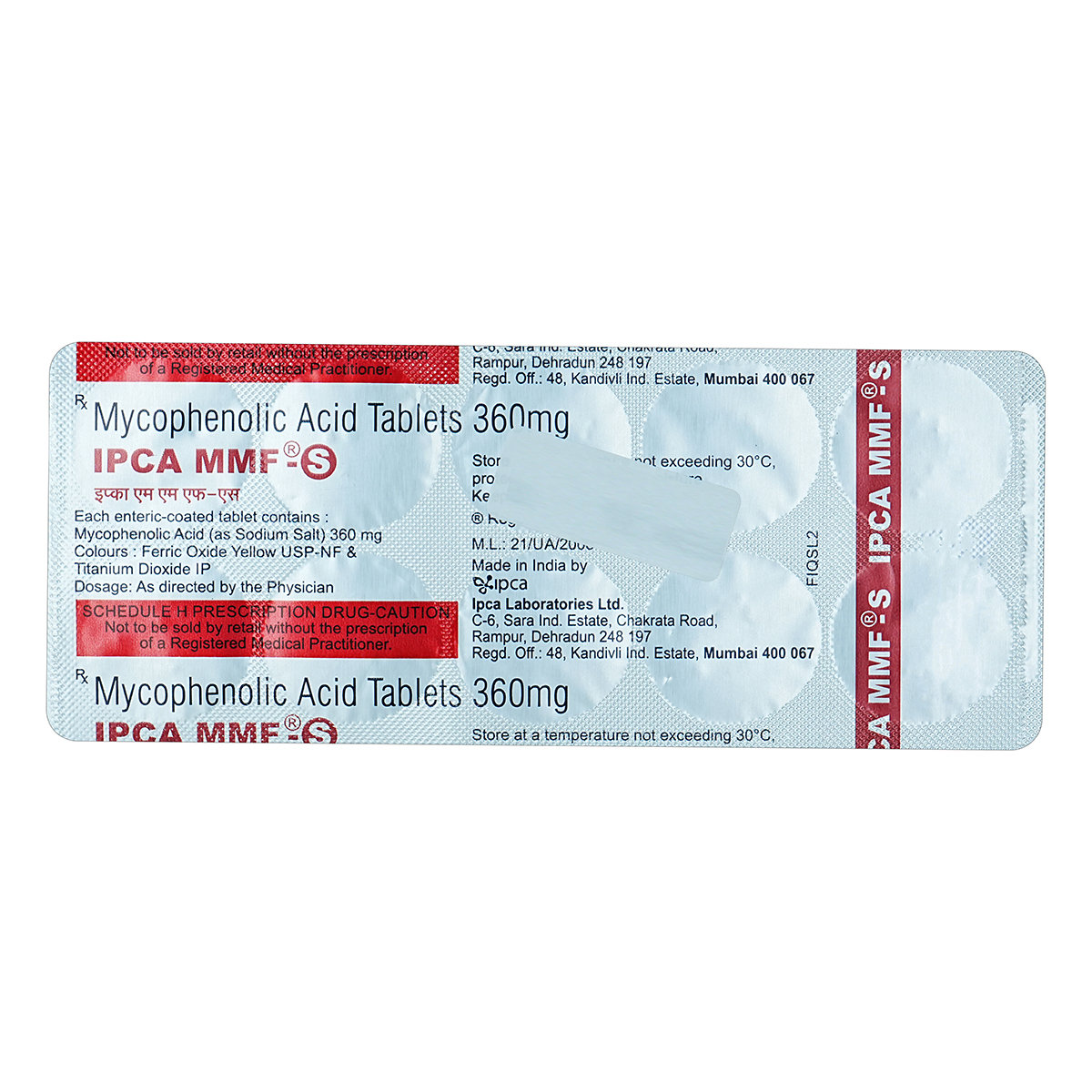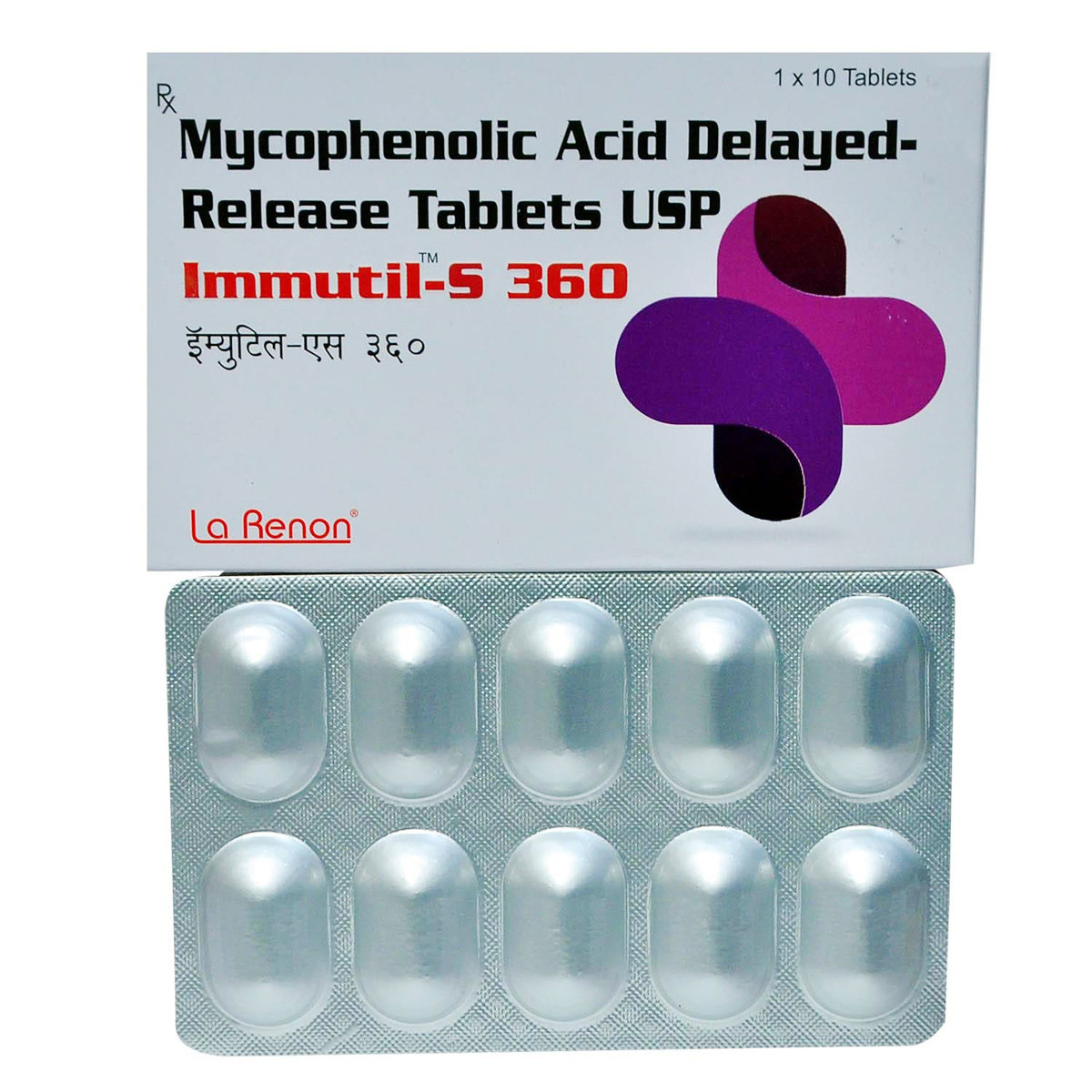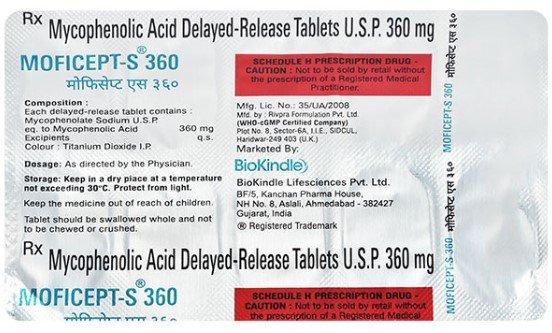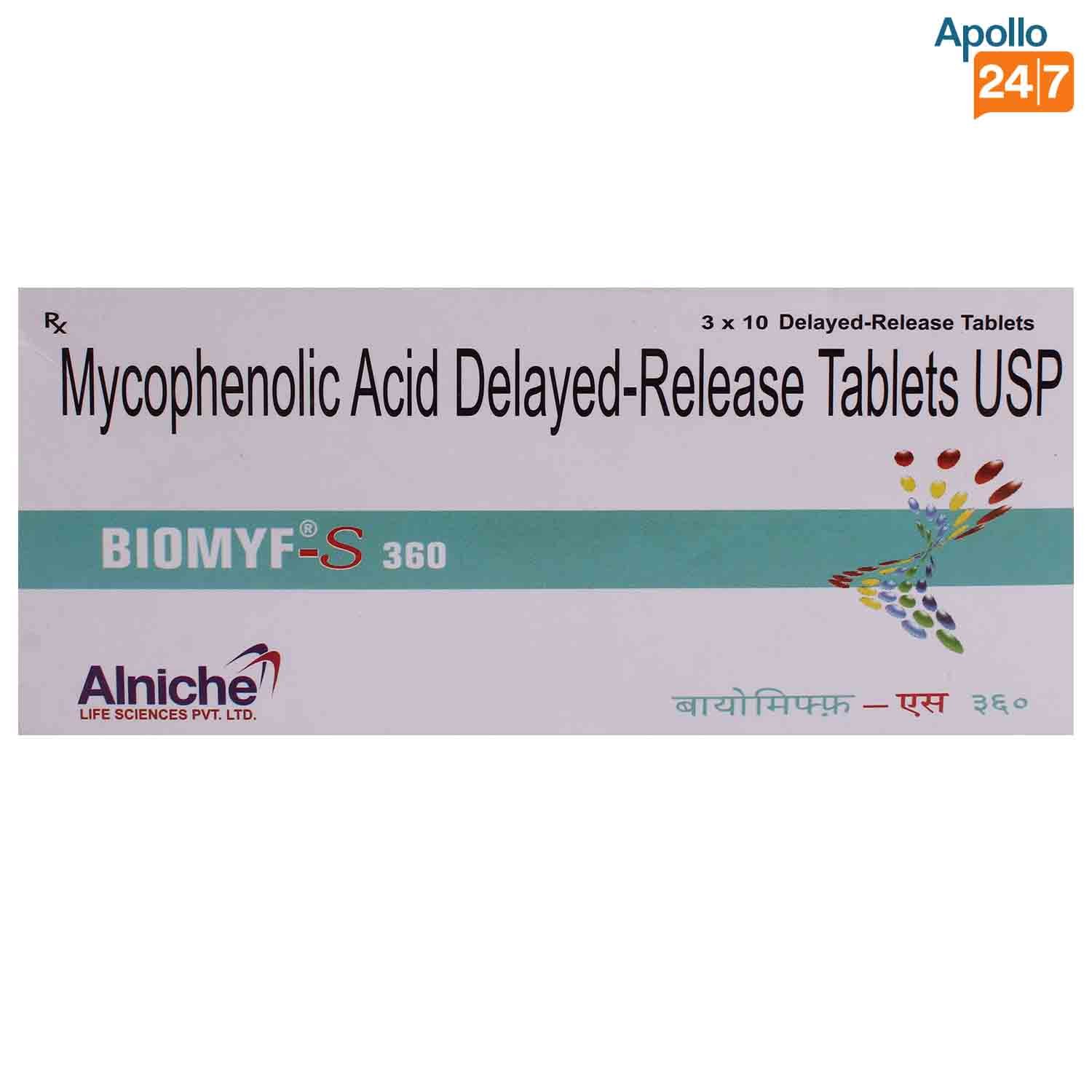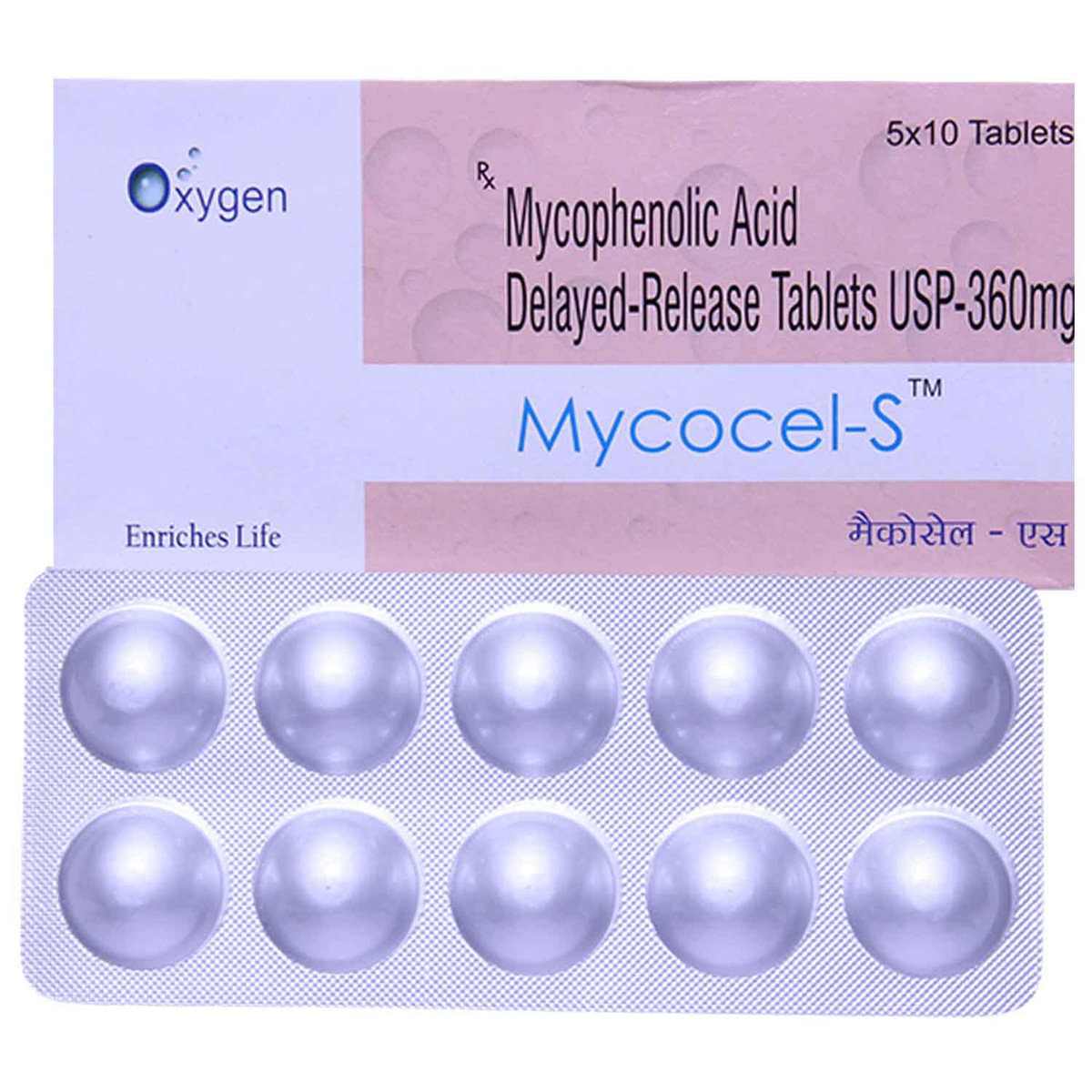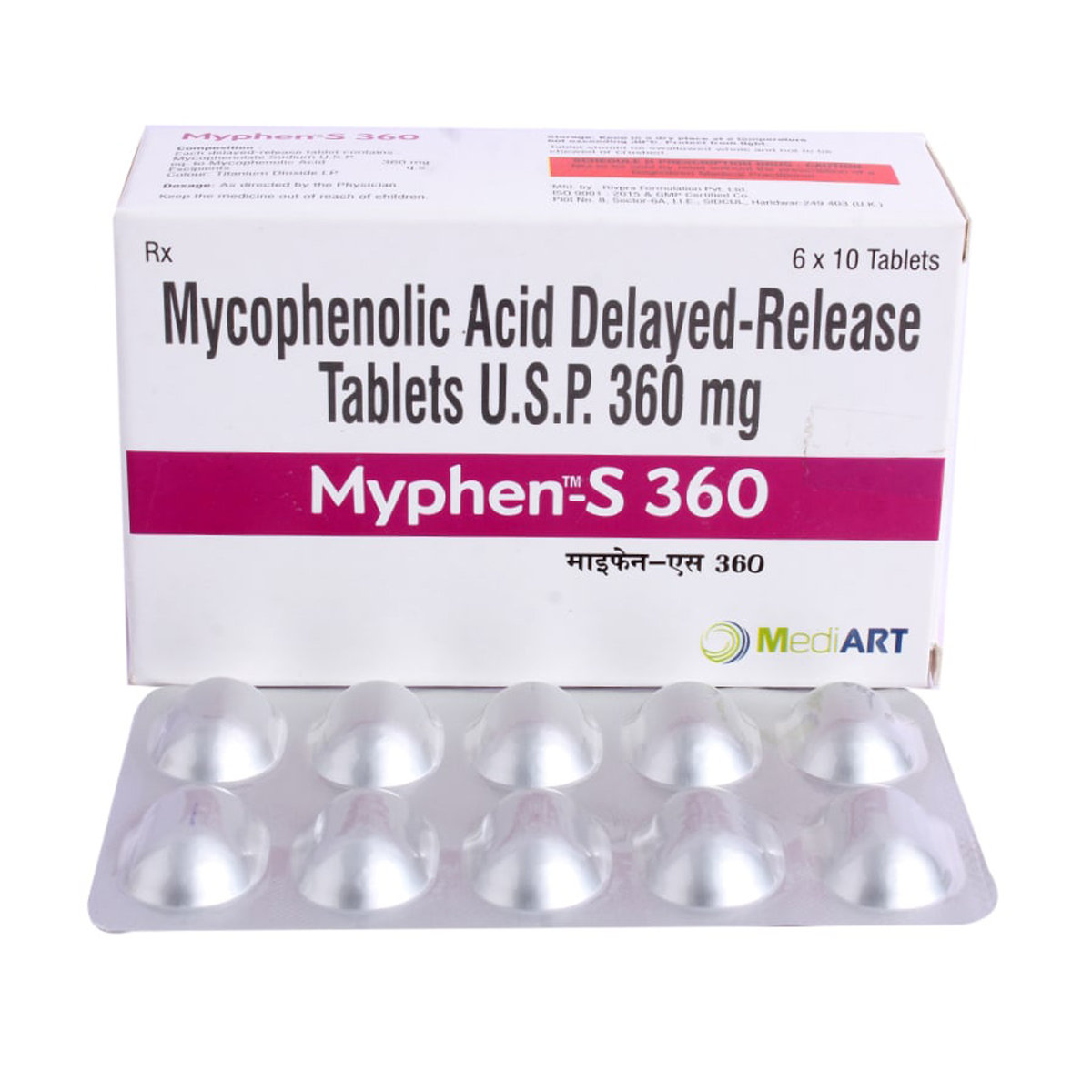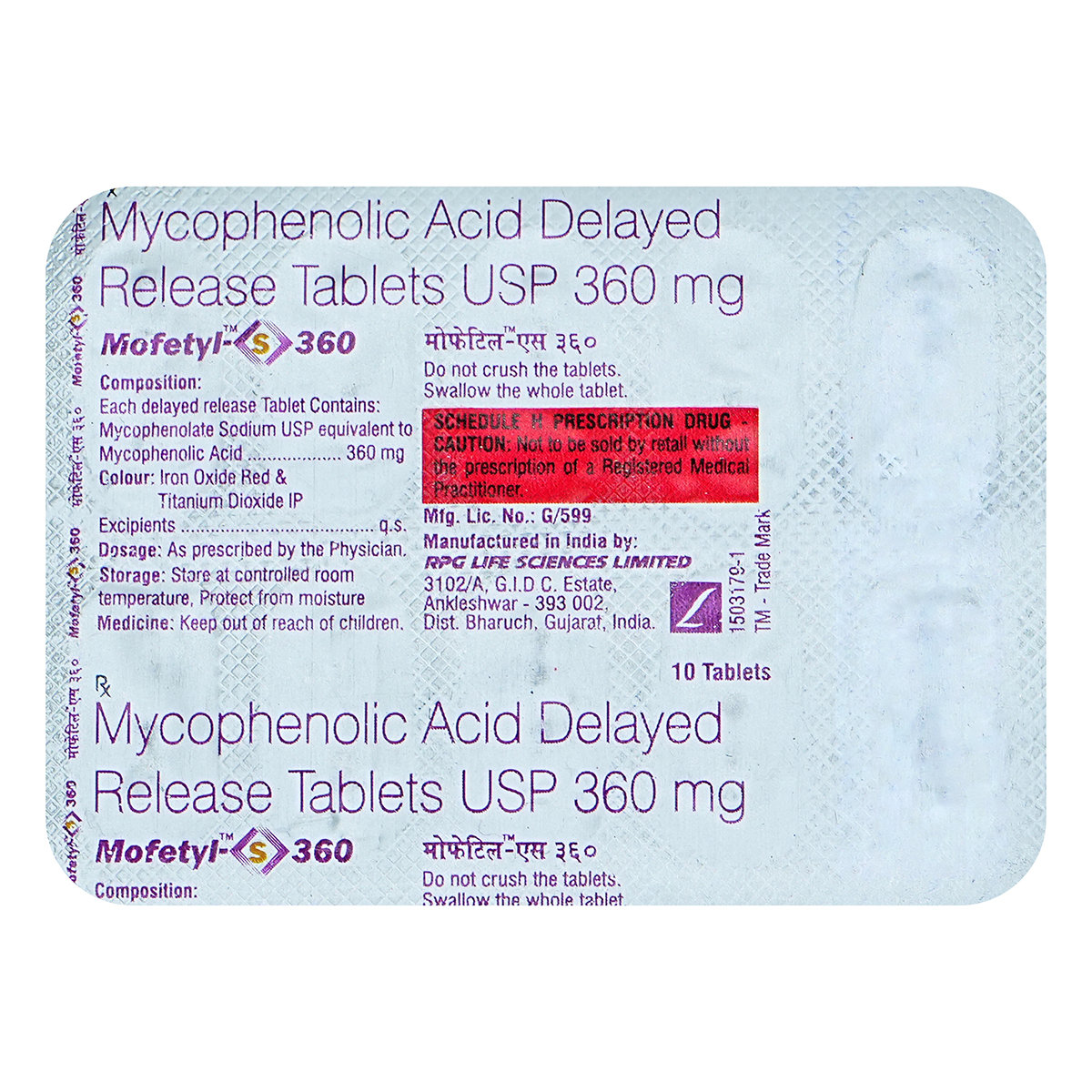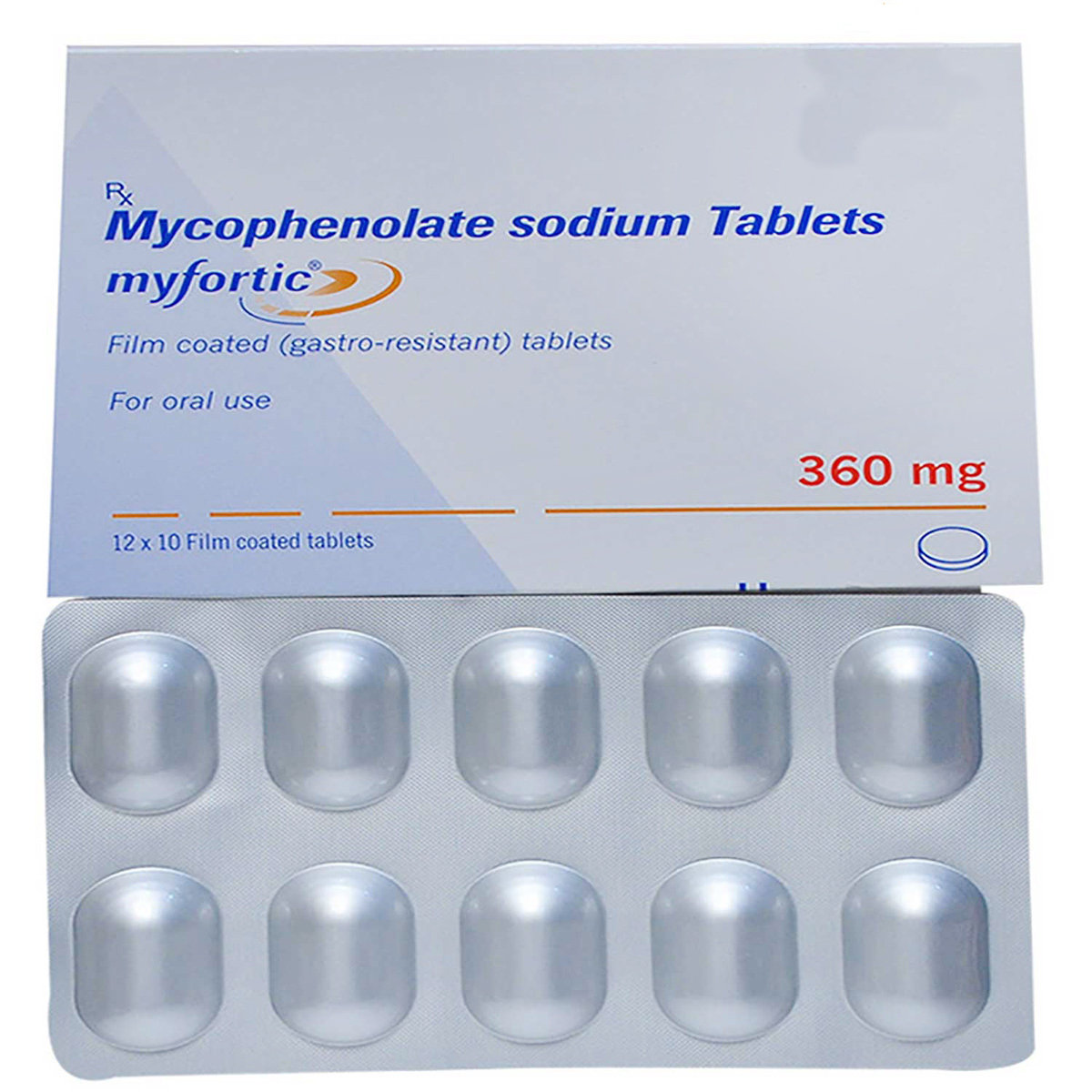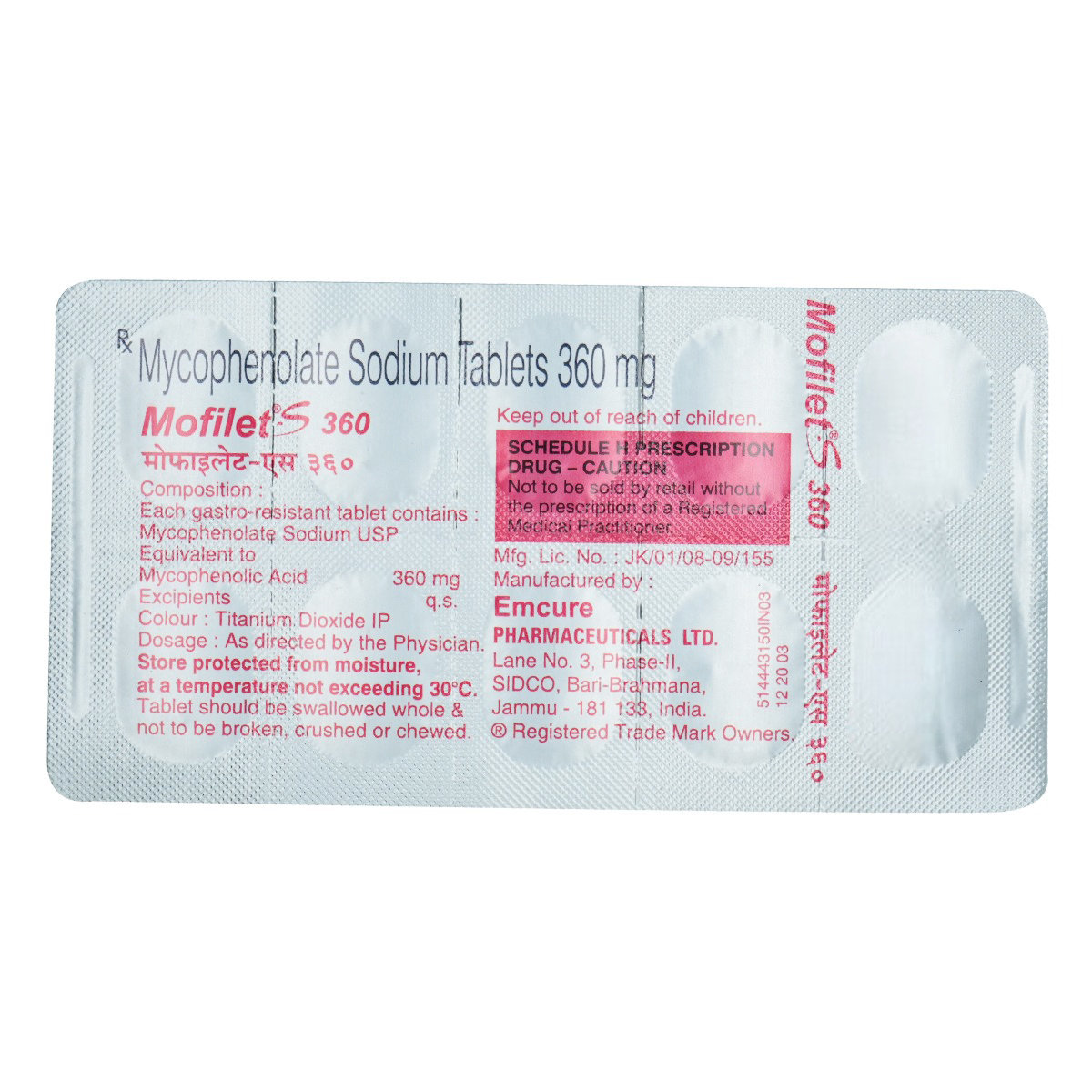Mofiren Tablet 10's
MRP ₹89.5
(Inclusive of all Taxes)
₹13.4 Cashback (15%)
Provide Delivery Location
Online payment accepted
 Prescription drug
Prescription drugWhats That
Composition :
Manufacturer/Marketer :
Consume Type :
Return Policy :
About Mofiren Tablet 10's
Mofiren Tablet 10's belongs to a class of medications called ‘immunosuppressants’ used to prevent the body from rejecting a transplanted organ such as a kidney, heart or liver. Transplant rejection occurs when the recipient’s immune system identifies the transplanted organ as a ‘foreign object’ and attacks it. If it is not treated promptly, it may cause irreversible damage.
Mofiren Tablet 10's contains ‘Mycophenolate sodium’ used in the treatment of organ transplant rejection along with another immunosuppressant and anti-inflammatory agent. It inhibits T and B lymphocytes (white blood cells that attack foreign cells) and suppresses antibodies' production (identify and kill foreign cells). These effects suppress the immune system so that the transplanted graft is not rejected.
You are advised to take Mofiren Tablet 10's for as long as your doctor has prescribed it for you depending on your medical condition. In some cases, you may experience certain common side-effects, such as diarrhoea, cough, muscle pain, low blood pressure, fever and respiratory infections. Most of these side-effects do not require medical attention and will resolve gradually over time. However, you are advised to talk to your doctor if you experience these side-effects persistently.
To treat your condition effectually, continue taking Mofiren Tablet 10's for as long as your doctor has prescribed. To avoid recurring symptoms, do not stop it midway. Do not take Mofiren Tablet 10's if you are pregnant or planning for pregnancy. Mofiren Tablet 10's should not be taken by breastfeeding mothers as it passes into breast milk. Mofiren Tablet 10's should not be given to children as safety and efficacy have not been established. Mofiren Tablet 10's may make you more susceptible to infections, consult your doctor if you develop fever, sore throat, breathlessness, jaundice, unexplained bleeding or bruising. Avoid excessive exposure to sunlight, wear protective clothing, and use protective sunscreen with a high protection factor while using Mofiren Tablet 10's. Do not contact anyone who has shingles, chickenpox, or measles. Do not take Mofiren Tablet 10's if you are not using effective contraception.
Uses of Mofiren Tablet 10's
Directions for Use
Key Benefits
Mofiren Tablet 10's contains ‘Mycophenolate sodium’ which belongs to the class of ‘immunosuppressants’. It is used to prevent organ transplant rejection. It reduces the activity of the immune system by inhibiting the action of white blood cells (responsible for immune reactions) in the body.
Storage
- Drink more fluids as dehydration can decrease blood flow to kidneys and increase BUN levels.
- Eat less protein and stop protein supplements as high protein diet may increase BUN levels.
- Severe cases may require kidney transplant or dialysis.
- Hydrate your body: Drink enough water to prevent dehydration and headaches.
- Calm Your Mind: Deep breathing and meditation can help you relax and relieve stress.
- Rest and Recharge: Sleep for 7-8 hours to reduce headache triggers.
- Take rest: lie down in a quiet, dark environment.
- Cold or warm compresses can help reduce tension.
- Stay Upright: Maintain good posture to keep symptoms from getting worse.
- To treat headaches naturally, try acupuncture or massage therapy.
- Over-the-counter pain relievers include acetaminophen and ibuprofen.
- Prescription Assistance: Speak with your doctor about more substantial drug alternatives.
- Severe Headaches: Seek emergency medical assistance for sudden, severe headaches.
- Frequent Headaches: If you get reoccurring headaches, consult your doctor.
- Headaches with Symptoms: Seek medical attention if your headaches include fever, disorientation, or weakness.
- If you observe any new and unusual marks on your skin, discontine the drug and reach out to your doctor for advice.
- If the cancer is in the early stage, your doctor may surgically remove the tumour.
- Radiation, cancer medications, or targeted treatments may be recommended based on the severity of the cancer.
- Consult a dietitian to make sure you are eating the right food and getting enough nutrition during cancer treatment.
- Eat your meals in small amounts with a gap of 2-3 hours.
- Do light physical activities to relieve tiredness and improve your overall well-being.
Drug Warnings
Do not take Mofiren Tablet 10's if you are allergic to any immunosuppressant medicines or mycophenolate sodium. Let your doctor know before using Mofiren Tablet 10's if you have liver or kidney problems, severe digestive issues, cancer, liver disease (such as hepatitis B, hepatitis C), current/past infections, rare genetic disorders (such as Lesch-Nyhan or Kelley-Seegmiller syndromes). Do not take Mofiren Tablet 10's if you are pregnant or planning for pregnancy as Mofiren Tablet 10's is a Pregnancy category risk D medicine which can cause serious congenital disabilities to the unborn baby. Mofiren Tablet 10's should not be taken by breastfeeding mothers as it passes into breast milk. Pregnant women should use reliable forms of birth control while on treatment and for six weeks after stopping treatment with Mofiren Tablet 10's. While taking Mofiren Tablet 10's, do not contact anyone who has shingles, chickenpox, or measles. Mofiren Tablet 10's causes dizziness and drowsiness, so drive with caution. Mofiren Tablet 10's should not be given to children as safety and efficacy have not been established. Avoid consuming alcohol along with Mofiren Tablet 10's as it could lead to increased dizziness. Your doctor may advise you to undergo regular blood tests, kidney and liver tests to monitor your condition. Avoid excessive exposure to sunlight, wear protective clothing, and use protective sunscreen with a high protection factor while using Mofiren Tablet 10's.
Drug-Drug Interactions
Drug-Drug Interactions
Login/Sign Up
Coadministration of Colestipol with Mofiren Tablet can reduce its absorption and action in the body. This can lead to low treatment results.
How to manage the interaction:
Taking Mofiren Tablet with Colestipol is not recommended as it can result in an interaction, it can be taken if your doctor has advised it.
Coadministration of Mofiren Tablet and Tofacitinib can increase the risk or severity of developing serious infections
How to manage the interaction:
Taking Mofiren Tablet and Tofacitinib together can possibly result in an interaction, it can be taken if your doctor has advised it. However, if you experience fever, chills, diarrhoea, sore throat, muscle aches, shortness of breath, blood in phlegm, weight loss, red or inflamed skin, body sores, and pain or burning during urination consult a doctor. Do not discontinue any medications without a doctor's advice.
Coadministration of Mofiren Tablet and Desogestrel can decrease the levels and action of Desogestrel.
How to manage the interaction:
Co-administration of Desogestrel with Mofiren Tablet can possibly result in an interaction, but it can be taken if your doctor has advised it. If you notice any of these symptoms: abnormal menstruation, dryness of the vagina, or increased hot flushes or if you're looking for other birth control options, consult a doctor. Do not discontinue any medications without consulting a doctor.
Coadministration of Ethinylestradiol with Mofiren Tablet may lower the blood levels and effects of Ethinylestradiol, making it less effective as a form of birth control.
How to manage the interaction:
There could be a possible interaction between Mofiren Tablet and Ethinylestradiol, but they can be taken together if a doctor has prescribed them. However, if you are taking hormone replacement therapy for menopause, and you notice an increase in the frequency or severity of your symptoms, such as hot flashes, vaginal dryness, or irregular bleeding, consult a doctor. Do not discontinue any medications without a doctor's advice.
Coadministration of Norethisterone and Mofiren Tablet can decrease the levels and effects of Norethisterone.
How to manage the interaction:
There could be a possible interaction between Mofiren Tablet and Norethisterone, but they can be taken together if your doctor has prescribed them. However, if you experience hot flashes, vaginal dryness, or abnormal bleeding consult a doctor. Do not discontinue any medications without a doctor's advice.
A combined use of Levonorgestrel with Mofiren Tablet may reduce the blood levels and effects of levonorgestrel, which may make it less reliable as a form of birth control, Mofiren Tablet may cause pregnancy loss in the first trimester and also birth defects in the unborn child.
How to manage the interaction:
There could be a possible interaction between Mofiren Tablet and Levonorgestrel, but they can be taken together if a doctor has prescribed them. However, if you take hormone replacement (Levonorgestrel) for menopause, and if you experience hot flashes, vaginal dryness, or abnormal bleeding consult a doctor. Do not discontinue any medications without a doctor's advice.
Coadministration of Mofiren Tablet and Colestyramine can decrease the effect of Mofiren Tablet.
How to manage the interaction:
There could be a possible interaction between Mofiren Tablet and Cholestyramine, it can be taken together if your doctor has prescribed them. However, if you experience fever, diarrhea, sore throat, muscle aches, shortness of breath, inflamed skin, body pain, or burning during urination consult a doctor. Do not discontinue any medications without a doctor's advice.
Taking Mofiren Tablet and Golimumab can lead to or increase the risk or severity of developing serious infections.
How to manage the interaction:
There could be a possible interaction between Mofiren Tablet and Golimumab, but they can be taken together if your doctor has prescribed them. However, if you experience fever, chills, diarrhoea, sore throat, muscle aches, shortness of breath, blood in phlegm, weight loss, red or inflamed skin, body sores, and pain or burning during urination consult a doctor. Do not discontinue any medications without a doctor's advice.
Coadministration of medroxyprogesterone with Mofiren Tablet may decrease the levels and effects of medroxyprogesterone.
How to manage the interaction:
There could be a possible interaction between Mofiren Tablet and Medroxyprogesterone, but they can be taken together if your doctor has prescribed them. However, if you experience hot flashes, vaginal dryness, or abnormal bleeding consult a doctor. Do not discontinue any medications without a doctor's advice.
Co-administration of Ferrous sulfate with Mofiren Tablet decreases levels of Mycophenolate by reducing its absorption.
How to manage the interaction:
There could be a possible interaction between Mofiren Tablet and Ferrous sulfate, but they can be taken together if a doctor has prescribed them. However, if you experience upset stomach, nausea, vomiting, diarrhea, constipation sleep problems, fatigue, headache, painful urination, high blood pressure, or swelling of the lower legs, ankles, or feet, joint pain, cough, or shortness of breath consult a doctor. Do not discontinue any medications without a doctor's advice.
Drug-Food Interactions
Drug-Food Interactions
Login/Sign Up
Diet & Lifestyle Advise
- Physical activity helps in strengthening muscles and relieves joint stiffness. Gentle activities like 20-30minutes of walking or swimming would be helpful.
- Performing yoga may also help in improving joint flexibility and pain management.
- Maintain a healthy weight by performing regular low-strain exercises and eating healthy food.
- Get adequate sleep as resting the muscles can help in reducing inflammation and swelling.
- Follow heat or cold therapy, apply a cold or hot compress on the joints for 15-20minutes regularly.
- De-stress yourself by meditating, reading books, taking a warm bubble bath or listen to soothing music.
- Acupuncture, massage and physical therapy may also be helpful.
- Eat food rich in antioxidants such as berries, spinach, kidney beans, dark chocolate, etc.
- Foods containing flavonoids help in reducing inflammation. These include soy, berries, broccoli, grapes, and green tea.
Side Effects of Mofiren Tablet 10's
- Dizziness
- Headache
- Cough
- Respiratory infections
- Weakness (asthenia)
- Muscle pain (myalgia)
- Shortness of breath (dyspnoea)
Habit Forming
Therapeutic Class
All Substitutes & Brand Comparisons
RX
My 360 Tablet 10's
Steadfast MediShield Pvt Ltd
₹600
(₹54.0 per unit)
503% COSTLIERRX
MMF-S Tablet 10's
Ipca Laboratories Ltd
₹659.5
(₹59.36 per unit)
563% COSTLIERRX
Ipca MMF-S Tablet 10's
Ipca Laboratories Ltd
₹659.5
(₹59.36 per unit)
563% COSTLIER
Drug-Diseases Interactions
Drug-Diseases Interactions
Login/Sign Up
FAQs
Mofiren Tablet 10's belongs to the group of medications called ‘immunosuppressants’. It works by weakening the immune system by inhibiting the production of cells or antibodies that attack foreign cells. This effect helps in stopping the immune system from targeting and rejecting the transplanted organ.
Mofiren Tablet 10's causes leukopenia (decreased number of white blood cells) and hence may make you more susceptible to infections. Consult your doctor if you develop any signs of infections such as fever, sore throat, breathlessness, jaundice, unexplained bleeding or bruising.
Diarrhoea might be a side-effect of Mofiren Tablet 10's. Drink lots of fluids and eat food rich in fibre if you experience diarrhoea. If you find blood in stools (tarry stools) or if you experience prolonged diarrhoea consult your doctor. Do not take anti-diarrheal medicine on your own.
Mofiren Tablet 10's can suppress the immune system and can increase the risk of skin cancer. So, it would be best if you avoid prolonged exposure to sunlight. Also, wear protective clothing covering your head, neck, arms and legs, and use a sunscreen lotion with a high SPF (sun protection factor).
Mofiren Tablet 10's can suppress the immune system. You should not donate blood while using Mofiren Tablet 10's and at least 60 days after stopping treatment as it makes you more prone to infections. Besides, men should not donate sperm while using Mofiren Tablet 10's for at least 90 days after stopping the treatment.
Some medicines might absorb mycophenolate sodium delayed or absorbed fast if taken concomitantly such as antacids containing aluminium or magnesium, colestipol, cholestyramine or calcium-free phosphate binders. Before taking Mofiren Tablet 10's, speak with your doctor about your ongoing medication list. Your doctor will decide whether they should be taken along with Mofiren Tablet 10's or not.
The live vaccine may not work while on treatment with Mofiren Tablet 10's. Do not have immunizations/vaccinations without talking to your doctor first. Also, avoid contact with people who recently had immunizations /vaccinations.
Drug-Drug Interactions Checker List
- TACROLIMUS
- CHOLESTYRAMINE
- ACTIVATED CHARCOAL
- ACICLOVIR
- GANCICLOVIR
Special Advise
- Use sunscreen while taking Mofiren Tablet 10's, as it can make your skin more sensitive to sunlight and may cause skin cancer.
- Do not donate blood while using this medication and for 6 weeks after stopping it. Do not donate sperm while using this medication and for 90 days after stopping it.
Disease/Condition Glossary
Organ transplant rejection: When you get a new organ transplanted into your body, your body recognizes it as a foreign element and tries to attack and reject it because it is not originally part of your body. So, immunosuppressant drugs are given to such patients to suppress the immune system, stopping it from attacking the newly transplanted organs. Warnings signs of rejection are flu-like symptoms such as chills, headache, nausea, or vomiting, fever higher than 100o F, newly found pain at the region of the transplanted organ, weight gain and fatigue.

Have a query?
Alcohol
Safe if prescribed
You are recommended to avoid alcohol consumption while taking Mofiren Tablet 10's. It could lead to increased dizziness and drowsiness.
Pregnancy
Consult your doctor
Mofiren Tablet 10's may cause birth defects and miscarriage if taken during pregnancy. Follow contraception advice given by your doctor if you are a woman who could become pregnant. Also, undergo a pregnancy test before starting treatment with Mofiren Tablet 10's.
Breast Feeding
Consult your doctor
It is not recommended to take Mofiren Tablet 10's while you are breastfeeding. Mofiren Tablet 10's passes into breast milk.
Driving
Safe if prescribed
Mofiren Tablet 10's may cause dizziness, tiredness, do not drive or operate heavy machinery if you feel dizzy.
Liver
Consult your doctor
Take Mofiren Tablet 10's only after the doctor's prescription, especially if you have liver diseases/conditions as your doctor may adjust the dose as required.
Kidney
Consult your doctor
Please consult your doctor if you have kidney impairment before taking Mofiren Tablet 10's as your doctor may adjust the dose as required.
Children
Safe if prescribed
Mofiren Tablet 10's should not be used by children below 18 years of age, as the efficacy and safety have not been established.




